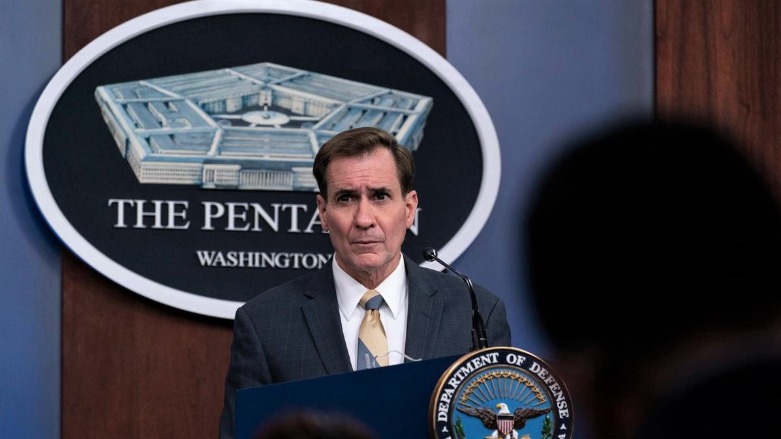Pentagon confirms: No major change in US troop presence in Iraq, after latest round of Strategic Dialogue

WASHINGTON DC (Kurdistan 24) – Addressing reporters on Friday, Pentagon Press Secretary John Kirby confirmed that the recent session of the US-Iraq Strategic Dialogue had resulted in no significant change to the US military presence in Iraq.
Kirby was pressed repeatedly on that question on Wednesday, following the meeting between US and Iraqi officials, which was held virtually.
Kirby had initially described the results of the meeting as “a reaffirmation of the partnership that we have enjoyed with Iraq and the significance of the mission that still exists against ISIS,” adding and “eventually we will want to talk about—when it's the appropriate time—the proper redeployment and the scoping of that footprint.”
Perhaps, because some Iraqi officials claimed that the meeting had resulted in a US agreement to withdraw its combat forces from Iraq, reporters wouldn’t accept Kirby’s characterization of the meeting.
They kept asking, what was new? Eventually, Kirby responded, “to have technical talks going forward about the potential redeployment.”
But, as Kirby explained two days later, when US forces returned to Iraq in 2014—“at the invitation of the Iraqi government”—no US official held “the expectation that we would be there forever.”
Read More: Strategic Dialogue changes little about US military presence in Iraq—despite erroneous reports
So nothing has really changed. The US always planned to withdraw its forces, once ISIS was defeated, while there is no significant number of US combat troops in Iraq now.
Shift from Combat Mission to Advise and Support
The change, in fact, occurred last July, when the US-led Coalition against ISIS transitioned from a combat mission, carried out as a Task Force (TF-1), to a Military Advisor Group (MAG.)
The Coalition marked the occasion with “a brief ceremony,” as a July 2 press release explained.
The ceremony “recognized the transition to Military Advisor Group, as TF-1 reduces its number of personnel and reorganizes as part of a new approach to support ISF [Iraqi Security Forces] defeat-Daesh [Islamic State group] operations,” the Coalition press release stated.
“The MAG will be smaller in size, but with expert specialized capabilities to advise Iraqi security staff and leaders,” it continued. Specifically, the MAG will assist the ISF “with operational planning, intelligence fusion, and air support for Iraqi-led military operations.”
What is a Combat Mission?
On Friday, the reporter who tried to make sense of the situation and thought the key to the confusion might lie in definitions, asked Kirby to explain, what, “in specific,” was meant by “combat forces.”
They are “troops that are, as a part of their core mission, engaged in direct, armed conflict with the enemy,” Kirby said. He explained the joint communique issued after Wednesday’s meeting simply “reaffirmed what had already been taking place—which is a transition, really, almost solely to advise and assist.”
In short, the Baghdad government wanted to portray developments that have already taken place—the end of the Coalition combat mission—as something new, for which it can take credit. At least to some extent, the US accommodated that.
KRG Welcomes Meeting
The Kurdistan Regional Government (KRG) responded quite positively to Wednesday’s session of the Strategic Dialogue, in which three senior KRG officials participated: Fawzi Hariri, head of the office of the President of the Kurdistan Region; Gen. Hazhar Zangana from the Ministry of Peshmerga Affairs; and Dr. Amanj Raheem from the KRG Council of Ministers, in addition to the KRG representative in Washington, Bayan Sami Abdul Rahman, who was part of the Iraqi embassy team.
On Thursday, KRG Prime Minister Masrour Barzani tweeted: “The KRG reaffirms its support for the talks. They are a pathway to greater engagement and cooperation—in reform, security, trade, investment, the environment, and clean energy.”
I welcome the third round of the US-Iraq Strategic Dialogue. The KRG reaffirms its support for the talks. They are a pathway to greater engagement and cooperation – in reform, security, trade, investment, the environment, and clean energy -mb.
— Masrour Barzani پابەندین# (@masrour_barzani) April 8, 2021
As Barzani noted (and Kirby had earlier said), Wednesday’s session of the Strategic Dialogue went far beyond the issue of the US troop presence.
Indeed, it included several positive elements from the KRG perspective. The US-Iraqi joint communique included the statement, “The United States welcomed progress between the Iraqi Federal Government and the Kurdistan Regional Government in reaching agreements on budgetary, energy, and other strategic issues.”
It also included, “The two countries intend to continue talks through the Joint Military Committee to ensure Global Coalition activities are aligned with and appropriately support the needs of the ISF, including the Peshmerga.”
That statement marked the first time that the Iraqi government, publicly and formally, recognized the need to support the Peshmerga.
Editing by John J. Catherine